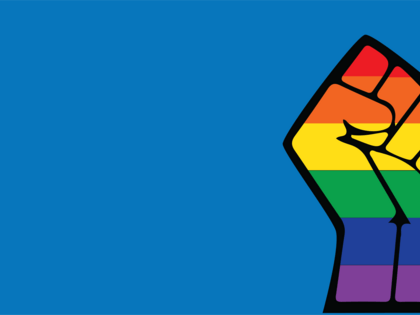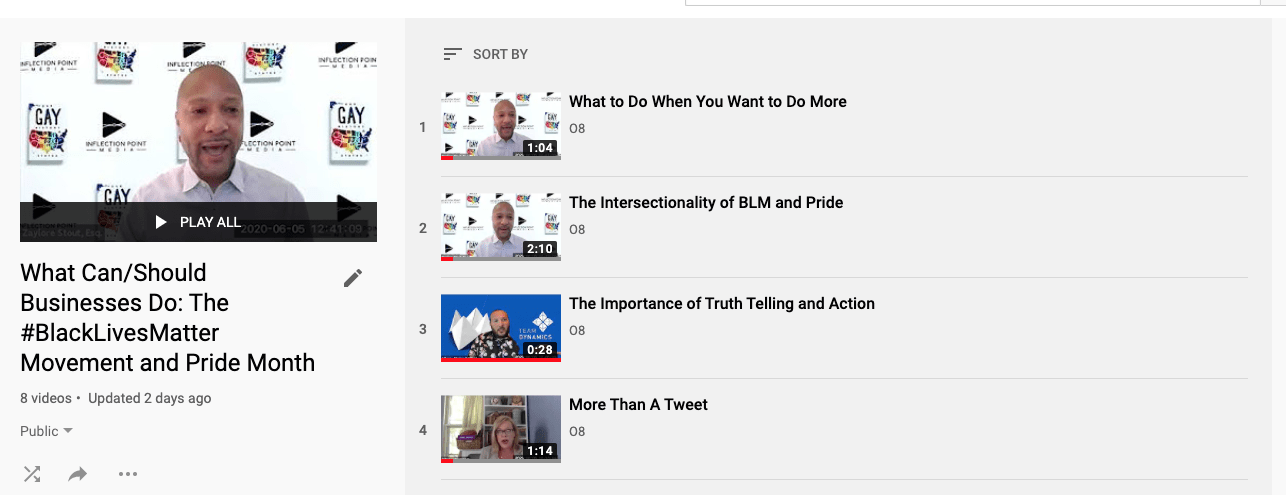What Can/Should Businesses Do: The #BLM Movement and Pride

In this panel discussion, co-hosted by Quorum, we discussed what businesses can and should be doing now and in the future given this historical uprising, the fact that it’s Pride Month, and the role of diversity and inclusion going forward. This content is for repurposing – anybody can use it for free.
This work is licensed under a Creative Commons Attribution 4.0 International License.

Panelists
- Zaylor Stout is author of the book Our Gay History in 50 States (https://www.gay50states.com/) and owns a local legal practice (http://www.stoutslaw.com/).
- Rebecca Waggoner (co-moderator) is the Executive Director of Quorum, the Twin Cities LGBT+ and Allied Chamber of Commerce.
- Chad Kampe is the Founder and Director of Flip Phone. Flip Phone partnered with Jared Maire, Heda Thrasher (Masoudeh Rezvani) and Elliot Fleck to raise nearly $100,000 to support relevant organizations to the BLM movement in just a few days via https://instagram.com/mnfundhub/.
- Alfonso Wenker is the President and Co-Founder of Team Dynamics which helps clients radically increase the effectiveness of multi-cultural teams.
- Seth Viebrock (co-moderator) is CEO of O8, a digital agency in Minneapolis. Seth is a digital activist, founder of the Chateau Fremont LGBT+ and Allied community space, and former Quorum board member.
High-Level Takeaways
- Instead of calling people out, call people in.
- This is not a time for business as usual.
- Don't just say something – review and be authentic.
- For marketers and communications professionals, phase your messaging – this isn’t just about this moment, but the long-term trajectory of your company.
- This is not a political issue – BIPOC folks have been politicized.
- Focus on local, not just national.
Expand your global reach with expert website translation and internationalization services
Sound Bites
How I Helped as One Person
Rebecca: Some of the ways that I have personally been able to help is because I have a lot of bandwidth. I have been having conversations with my white friends saying we have to make changes. And, not calling people out, but calling people in, for example, on Facebook, and being able to have those conversations that make change.
And then there's the basic stuff, like getting out and cleaning streets and giving to food drives because lots of people are hurting right now. So taking all those steps and it's just the beginning.
Being a Black Man in This Country
Zaylore: This has hit me hard because each and every time one of these shootings happens, you think am I the one that could be next? Being a black man in this country always puts you in a different category and position and others. And so I've sought support by speaking with other members of the black community. This one just hit us extremely hard because it's like, how many times can we scream at the top of our lungs for help in regards to this issue and nobody listens.
The Importance of Truth-Telling and Action
Alfonso: Professionally, we've been supporting our clients to figure out how they do three things. One is to tell the truth. A black man was murdered by police, and that's the result of structural racism and a legacy of white supremacy, right? The second is to hold space for that truth telling, but also for their workers to talk about how this is affecting them. And the third is “What are your actions going to look like beyond just holding that space?”
More Than A Tweet
Rebecca: What we've been doing is not working. Business as usual is not working. I know that I am part of an organization where we have a lot of people at a lot of various points in this journey and we're learning how to not be racist and learning how to be specifically anti-racist, learning how to amplify voices. And I know that that journey is starting because of this.
And I also think that as we move forward, one of the other things that businesses can do beyond putting out a tweet, (and we love tweets), is actually doing the real work of looking at unconscious bias in hiring and sourcing products. And it’s looking at developing leadership paths as true and authentic leadership paths specifically for people of color, right?
Chad: I think the big thing that people are worried about is losing customers. What if I lose customers if I say “Black Lives Matter” or “defund the police”? Those are customers that you don't want anyway, which I think is the big discussion. That these are people that, at least with our mission, we don't want them attending our shows. If people are supportive of this and don't see the bigger picture, there's plenty of other people who are and say goodbye to those people.
The Intersectionality of BLM and Pride
Zaylore: There's different layers to who we are, right? And understanding and recognizing that in your employees, it starts at home. So at companies, it's doing that and recognizing our employees. And then that creates a culture where your employees see that inherent humanity and individuality in everybody else that they come in contact with.
And so companies must be willing to work and start with that fundamental piece at home with their employees and understand why they have retention issues in regards to LGBT folks, and why they have retention issues in regards to black and brown folks, and why they don’t have a lot of women as members of senior management. I mean, all of these things and all of these numbers and all these demographics, this isn't new news, right? This isn't new news for us.
And so again, it's being forthright and intentional in regards to that, so that when there are Pride events or when there are Black Lives Matter events, we can celebrate you and your accomplishments because we've watched you on this journey. And you've allowed for us to be aware of where you started and we can track your progress.
Alfonso: I think for us as queer folks, as a movement, this is an opportunity to actually return to our roots and return to our history. Trans women of color, black trans women, and drag queens are the founders of our movement and have always been on the cutting edge, front lines of our movements.
I think as a community, Pride has gotten away from talking about the truth of that history. And I'm not the first or only person saying that. But we can stop talking about black folks, folks of color, and queer folks as separate. I'm a queer person of color and so I want to talk at exactly the intersection of anti-LGBTQ sentiment, homophobia, transphobia, biphobia, and racism. I'm not interested in a brand or a workplace that can't hold that complexity.
Building Authentic Relationships
Rebecca: This is an opportunity to build authentic, less transactional relationships, true authentic relationships that are built on intentions, humility, and courage, and the desire to truly create change. And it's obviously beyond one person, it's beyond any single individual.
What to Do When You Want to Do More
Zaylore: Sometimes it's going to relate to what expertise it is that you have that you bring to the table because all of us have different areas where we have our individual strengths. So I know that there's law firms that are doing pro bono work to help the businesses that have either been looted or burned down or impacted. They file their claims and fight their claims with the insurance companies, if they don't want to provide it to them.
Another thing is these areas that don't have a grocery store because their grocery stores have been burned down and the liquor stores and the little bodegas have all been burned down and now there's a food desert. They're going to need help moving forward, not just today when the news media is there and everything, but weeks and months down the line.
And so there's not only that, but a lot of the people that say that I saw are helping in North Minneapolis, I don't normally see there. And so the question is going to be as once these businesses come back, making a concerted effort to go and eat at these restaurants to do business with those businesses over there, that's the stuff that makes a substantial difference as well. And so committing to those black businesses from that perspective is what's going to be able to help us move forward too.
What Kind of Economy Do You Want to Be a Part Of?
Alfonso: Do you want to be a part of an economy that allows LGBTQ black and brown people to thrive, or do you want to be a part of an economy that kills black and brown and LGBTQ people? And if you want to be a part of an economy where black and brown and LGBTQ people thrive, then you need to move your money in those directions, with who you're hiring and with all that you do. And so to have a deep analysis of your economic behavior and say does your economic behavior uplift or hold back the communities that you claim you care about in those aforementioned tweets.
Zaylore: One other thing that I want to make sure that I add is that organizations, I think especially it's a lot of the larger companies focus on supporting the larger national LGBT organizations and not supporting the local organizations that are doing a lot of work that's actually on the ground.
I mean, yes, there's a lot of political advocacy that happens on a national level, which is important for us to get the equality act passed and things of that nature, but we need help in the states too, right? We need help at the local county levels as well.
And so I would really strongly encourage those companies because these large companies are headquartered all over the country, right? To not only focus on supporting those large LGBT organizations but also support the local organizations where if it's where you're headquartered and LGBT and queer and organizations that are owned and led by people of color as well.
Resources
- MN Fund Hub
- Instagram (from reputable accounts)
- National LGBT Chamber of Commerce (NGLCC) small business webinars
- Jason Reynolds' Stamped: Racism, Antiracism, And You (book)
- Seeing White (podcast)
- Team Dynamics (workplace guide for internal conversations)
- Reclaim the Block
- Talk to people!!!! (but don’t make it a Black person’s job to educate you)


